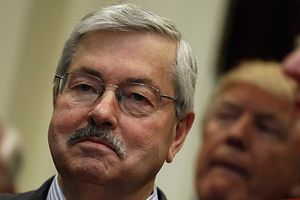They say “personnel is policy.” In foreign relations, U.S. President Donald Trump largely has neither. Key national security posts across the government remain empty, and many of the appointments he has made seem as likely to burn out as they do to eventually shape global affairs.
Mike Flynn became the shortest-serving national security advisor in history, and White House advisor Steve Bannon, while still exerting nationalist influences, has reportedly faded. Hapless Secretary of State Rex Tillerson, a much-vaunted international dealmaker from the private sector, has suffered significant missteps abroad and is hemorrhaging credibility.
As a result, this week the Senate is considering an unlikely heir for Trump’s entire foreign policy in Asia: the mild-mannered and mustachioed Iowa Governor Terry Branstad.
Branstad is no Washington insider, but is also no lightweight. Though never seriously considered a candidate for higher office, the longtime governor of Iowa has nonetheless successfully overseen the state’s growth into an agriculture and manufacturing export power. Branstad’s half-dozen trade missions to China have also coincided with deepening commercial and cultural ties between Iowa and the middle kingdom. The state’s food exports to China have doubled in three years, with a quarter of all Iowan soybeans now selling to Chinese customers. The Iowa governor has also benefited from a decades-long friendship with Chinese President Xi Jinping, dating back to when the young Xi visited Iowa to study agriculture in the 1980s. While Branstad’s nomination may have at first prompted some head-scratching among foreign policy establishment figures, his international economic bona fides have since been broadly accepted.
Despite Trump’s skepticism of trade with China, it is still easy to see how he might read a favored personal narrative into Branstad: a well-connected dealmaker who, in spite of distance from his field’s elites, has enjoyed success at the intersection of public policy and commerce. Yet Branstad represents a favored political narrative as well. Iowa – my home state – has undergone a striking rightward shift since giving then-Senator Barack Obama his first primary victory in 2008. Whiter, older, and more rural than much of the country, Iowa has seen the same non-college white voter consolidation that helped flip many formerly blue states red this past November.
Branstad consequently holds perhaps the rarest position in Washington: a Trump-friendly background, a Trump-enthusiastic constituency, and deep experience relevant to his appointment. If the Iowa governor succeeds in his new role shepherding the most important bilateral relationship in the world, it will validate the president’s instinctual disdain for the traditional foreign policy elite.
Unfortunately, while Branstad may have been a compelling pick for a China envoy in a normal administration, he may not be equipped for the responsibilities that will be thrust upon him by Trump. Almost all major Asia policy posts across the government remain conspicuously vacant. Branstad would be one of the first political appointees to take on the region’s increasingly urgent challenges, and he remains the only ambassador to Asia even submitted to the Senate. Branstad, upon arriving in Beijing, may soon be Trump’s man for all of Asia by default.
This would be a challenge for any accomplished public servant, but the background that made Branstad so appealing to Trump may also leave him unprepared for what awaits him. The governor is adept at fostering bilateral trade, but is no diplomat and has no experience in deterrence or national security strategy. The sparsely populated State Department is unlikely to provide the back-up Branstad would otherwise expect. Tillerson himself, while like Branstad fluent in international economics, suffered a rocky start widely attributed to a poor understanding of the political, strategic, and media dimensions of diplomacy. A nuclear standoff over North Korea would be poor on-the-job training for them both.
The governor from Iowa has his work cut out for him. If he manages to help steer American policy away from a deadly confrontation with Pyongyang while maintaining a productive relationship with Beijing, Trump will have a powerful argument for why he does not need traditional Washington talent.
If Branstad fails, however, it’s not at all clear who would be available to manage the aftermath.
Harry Krejsa, a native Iowan, is an Asia-Pacific Security specialist at the Center for a New American Security in Washington.

































